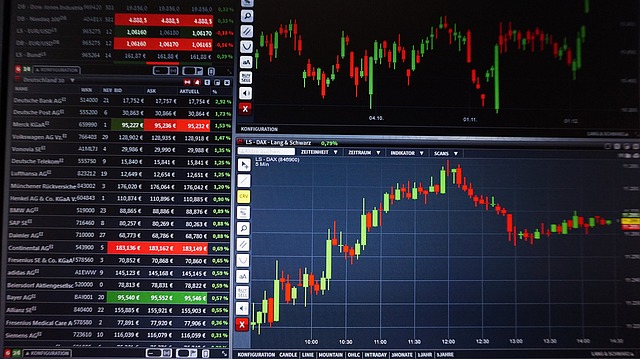The Evolution and Significance of Cryptocurrency Trading Platforms
Author: Jameson Richman Expert
Published On: 2024-08-13
Prepared by Jameson Richman and our team of experts with over a decade of experience in cryptocurrency and digital asset analysis. Learn more about us.
Cryptocurrency has penetrated the mainstream consciousness over the last decade, evolving from a niche interest to a multi-billion-dollar industry. At the heart of this evolution are cryptocurrency trading platforms. These digital marketplaces are vital for facilitating the buying, selling, and trading of cryptocurrencies. In this article, we will delve into the intricacies of cryptocurrency trading platforms, their functionalities, advantages, challenges, and future prospects.

Understanding Cryptocurrency Trading Platforms
Before diving into the specific details, it's important to clarify what cryptocurrency trading platforms are. Essentially, these are online applications or services that allow users to trade various cryptocurrencies against fiat currencies or other cryptocurrencies. They act as intermediaries that match buyers with sellers.
Types of Cryptocurrency Trading Platforms
Cryptocurrency trading platforms can be broadly categorized into different types:
- 1. Centralized Exchanges (CEX): These are the most popular trading platforms, where a central authority manages transactions. They offer high liquidity and ease of use but come with risks related to trust and security.
- 2. Decentralized Exchanges (DEX): Unlike centralized exchanges, DEX operate without a central authority, allowing users to trade directly with one another. They offer enhanced privacy and security, albeit with lower liquidity and usability challenges.
- 3. Peer-to-Peer (P2P) Platforms: These platforms enable users to trade directly with one another, often facilitating the exchange of fiat currency for crypto. They provide a great level of user autonomy and lower fees.
- 4. Crypto Brokerage Services: These are platforms that act as a middleman between buyers and sellers, allowing users to buy cryptocurrencies at a fixed price. They are particularly useful for beginners.
Centralized Exchanges (CEX) - The Leading Choice
In my opinion, while centralized exchanges offer convenience, the key drawback lies in their reliance on a central authority. This reliance creates vulnerabilities, as seen when high-profile platforms like Mt. Gox collapsed due to security breaches. Therefore, while they are often user-friendly, it's crucial for traders to stay vigilant and use trusted platforms.
Decentralized Exchanges (DEX) - A New Frontier
On the other hand, DEX are gaining traction for those who prioritize privacy and decentralization. They eliminate the need for a trusted intermediary, allowing users to maintain control over their funds. However, trading on DEX can be less intuitive, which may deter new users. Therefore, the evolution of user interfaces on DEX is a significant area of interest for the future.
Features of Cryptocurrency Trading Platforms
With various types of platforms available, it's essential to explore the features each offers. The following are some common features found in leading cryptocurrency trading platforms:
1. User Interface and Experience
Most successful platforms prioritize a user-friendly interface. A well-designed dashboard can greatly enhance the user experience, making it easier for both novice and expert traders to navigate the complexities of trading.
2. Security Measures
Security is paramount in the cryptocurrency space due to its susceptibility to hacking and fraud. Features like two-factor authentication, cold storage for funds, and regular security audits are essential for maintaining trust in a platform.
3. Liquidity
Liquidity refers to how easily a cryptocurrency can be bought or sold without significantly affecting its price. High liquidity is favorable as it allows for smoother transactions and fewer price fluctuations. Centralized exchanges typically excel in this aspect, making them the preferred choice for day traders.
4. Transaction and Withdrawal Fees
Different platforms have varying fee structures. Understanding these fees is critical for traders as they can accumulate over multiple transactions. Some platforms have hidden costs that users may not be immediately aware of.
5. Variety of Trading Pairs
The availability of diverse trading pairs is essential for traders looking to expand their portfolios. Leading platforms support a wide range of cryptocurrencies and trading options, which can help traders capitalize on market movements.
Benefits of Using Cryptocurrency Trading Platforms
Using a cryptocurrency trading platform can offer multiple benefits:
- Accessibility: These platforms provide users with easy access to the cryptocurrency market, allowing anyone with an internet connection to participate.
- Speed: Transactions are usually completed quickly, allowing traders to seize market opportunities as they arise.
- Advanced Tools: Many platforms offer analytical tools, charts, and trading bots, enabling traders to make informed decisions.

Challenges and Risks Associated with Cryptocurrency Trading Platforms
Despite the benefits, trading platforms are not without their challenges. Here are some of the most significant risks:
1. Regulatory Challenges
The legal landscape surrounding cryptocurrency is complex and continually evolving. Traders must stay informed about the regulations that govern their activities in their respective jurisdictions. In my view, this uncertainty can be daunting, particularly for individuals new to cryptocurrency.
2. Security Risks
As previously mentioned, security is a critical concern. While many platforms use advanced security measures, breaches can and do occur. Users must take personal responsibility for securing their accounts, which can be a turning point in their cryptocurrency journey.
3. Market Volatility
Cryptocurrency markets are notorious for their volatility. Prices can fluctuate wildly, leading to substantial gains or catastrophic losses. While this volatility presents opportunities, it also poses risks, particularly for inexperienced traders who may be unprepared for sudden market shifts.
The Future of Cryptocurrency Trading Platforms
Looking ahead, the future of cryptocurrency trading platforms appears promising. With technological advancements emerging daily, traders can expect to see more sophisticated platforms that offer enhanced features and improved user experiences. I believe the integration of artificial intelligence could become a significant trend, providing traders with powerful tools for decision-making based on market analysis.
The Integration of Decentralized Finance (DeFi)
DeFi platforms are changing the way users interact with cryptocurrencies by providing financial services without intermediaries. As these platforms grow, we might see a blending of traditional trading platforms with DeFi elements to offer users more options.
Increased Focus on Regulation and Compliance
As governments around the world scrutinize the cryptocurrency market more closely, adherence to regulatory frameworks will become increasingly essential. Trading platforms that prioritize compliance will undoubtedly gain a competitive edge.
Conclusion
In summary, cryptocurrency trading platforms are crucial for the growth and development of the cryptocurrency market. They provide the necessary infrastructure for users to trade efficiently and safely, but they also come with their complexities and risks. As the industry evolves, so too will the platforms, continuously adapting to meet the needs of their users. It is imperative for traders, both novice and experienced, to remain informed, practice due diligence, and select trading platforms that suit their individual requirements.
In my view, the allure of cryptocurrency trading can be likened to wild, untamed territory—exciting yet fraught with peril. Engaging with this landscape necessitates a careful approach, balancing ambition with caution. As we look to the future, the coming years promise not only growth and innovation but also challenges that will test the resilience of traders and platforms alike.